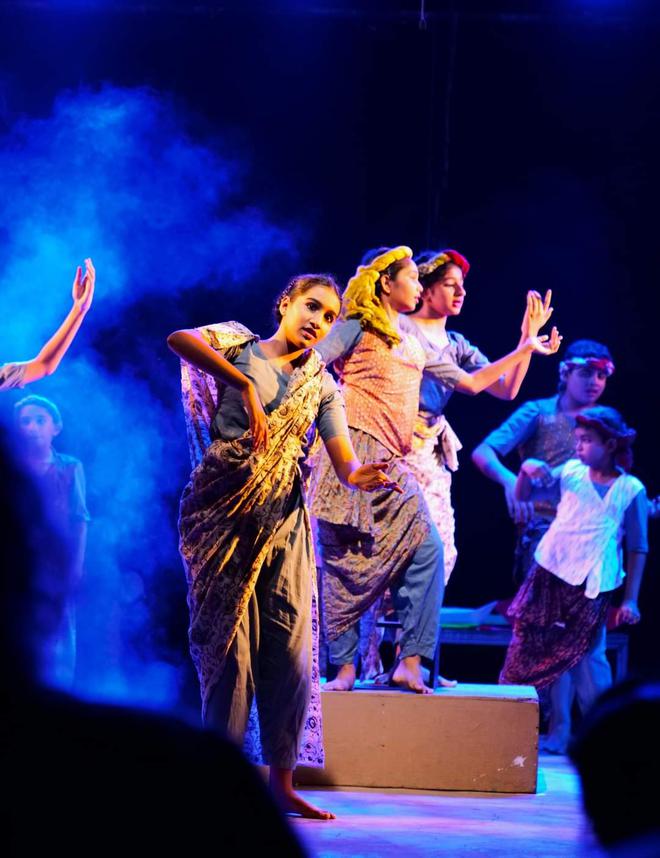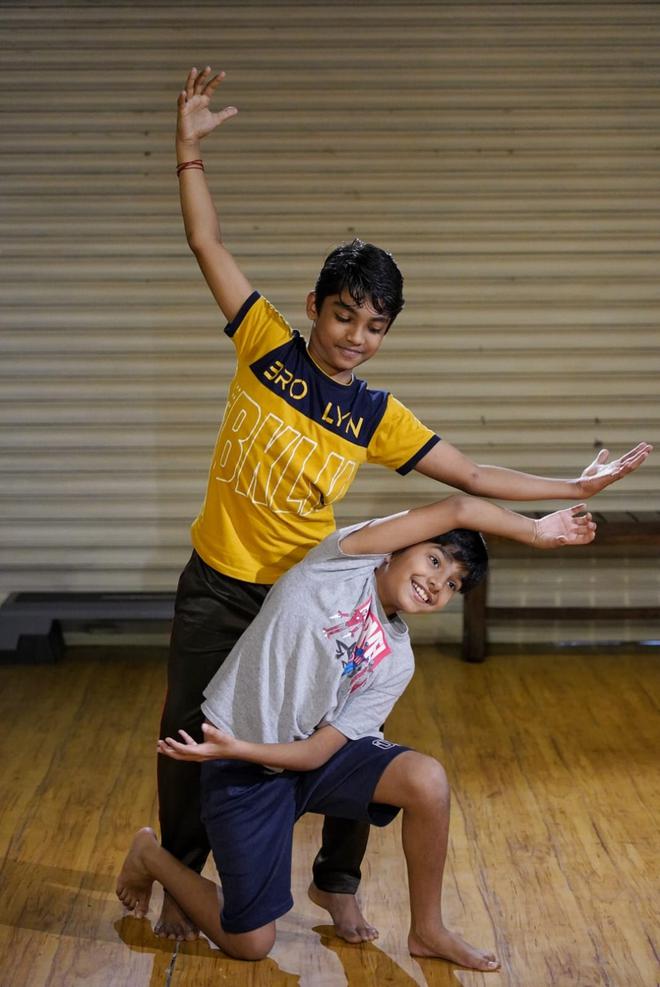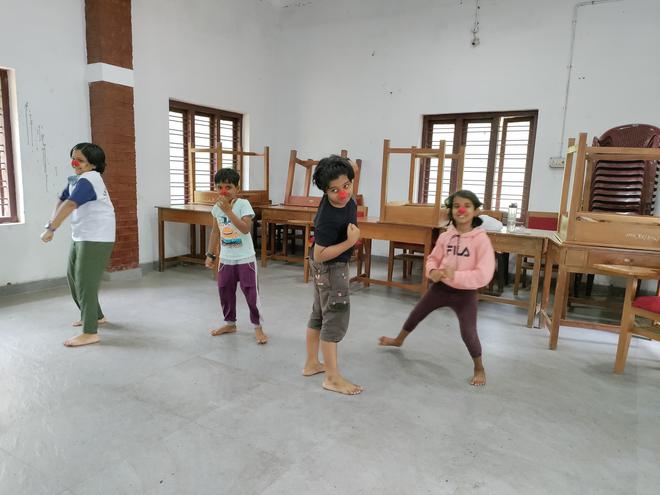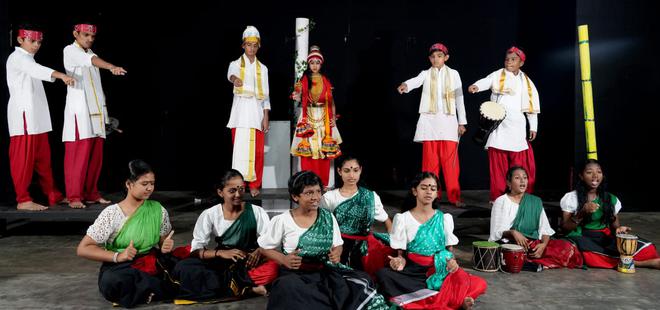In the summer of 2000, at the end of a fun-filled four-day children’s theatre camp in Kochi organised by Lokadharmi Centre for Theatre, a participant asked its facilitator, Lokadharmi’s artistic director and eminent dramaturg Chandradasan why he could not make the camp a regular feature.
Taken by surprise, Chandradasan readily replied that he would be there the next day and anyone who wished to come by could do so. “To my joy, I found that at least eight children had turned up,” says Chandradasan.
That was the starting point of Lokadharmi’s Mazhavillu, a children’s theatre initiative in the city, which has been organising workshops every Saturday since 2000.
Seven months after Mazhavillu was formed, it staged its first play, Habib Tanvir’s Charandas Chor, adapted by Chandradasan. “I had suggested a couple of plays, all of which were shot down by the children. They found them boring. When I told them the story of Charandas, however, they approved,” he adds. “They taught me how a children’s play should be.”
Mazhavillu went on to stage several plays since, the latest being The Boat Boy in December 2023.

Over the years of working with children, Chandradasan says it is rewarding to watch them grow with theatre. “They are not just acting, but living life’s realities on stage. They become more self aware,” he says. It offers a break from the monolithic culture of the schools, as they interact with children from various backgrounds and form lasting bonds. They read, write, engage in art and craft, too, at the workshop. Mazhavillu focuses on Malayalam plays, which gives children an opportunity to learn the language better.
Theatre, says Chandradasan, is the only space where children can express themselves unfettered.
Mazhavillu summer camp is from April 9 to 13 at Lokadharmi Nadakaveedu, Nayarambalam. Open to children between eight and 15 years of age. (9447414200).

Rasa Theatre Collective
“Children who have exposure to theatre become more open to life,” says Sidharth Varma, theatre practitioner, and co-founder of Rasa Theatre Collective. Rasa’s children’s theatre workshops, called Kuttykoottam, are an inclusive, non-judgmental space that lets children be. “The idea here is not to create a better actor; but a better human being,” says Sidharth. Children learn to ask questions and become active listeners in the process. “Here they experience the world in their own way. There is no sense of competition; it is an uninhibited space where they have cathartic moments,” he adds. Rasa, which was formed by theatre practitioner Rahul Thomas and Sidharth, three years ago, has organised over 20 Kuttykoottams till date. The camps are designed to help children open up and express themselves using the body. Since some children enjoy putting pen to paper, they are asked to write or draw what they observe. There are games as well. “This gives them a space for personal reflection and brings out their creativity,” Sidharth adds.
Kuttykoottams will be held in April and May this year for the six-to-10 age group. (9884634412).
Kerala Museum
At the end of the summer camp in 2023, at the Kerala History Museum, the children put up a play, conceived, scripted, directed entirely by them. The 40-minute Malayalam play, which was on the apartment buildings that were brought down in Maradu, Kochi, (owing to violation of environmental norms), was an impressive effort, says Aditi Nayar, museum director. “It showed the children’s ability to collaborate as a team,” she adds. The Kerala Museum has been organising summer camps for children since 2012, which includes a variety of hands-on activities such as puppet making, clay modelling and reading in addition to reading and drama. “They go through the entire creative process — discussions, ideation and storyboarding,” says Aditi. “These camps usually go beyond theatre, when one observes carefully, it is often just one human talking to another respectfully,” she adds. This year’s camp will be held in April. It will have facilitators including artists and architects. The theme will be centred around the ongoing gender fest at the museum. “We have a doll’s exhibit here. For the camp, we would be looking at the exhibit from a gender perspective – the body, the differences,” Aditi says.
For children from six to 12. (8129051881).

Space of Act
“Everyone has an inner clown waiting to come out. Children are intrinsically playful and the ideas flow organically when working with them,” says theatre-maker Ajithlal Sivalal, who has been clowning since 2014 and conducting workshops for children. As a facilitator, one has to spark their curiosity and fire their imagination, he adds. Ajithlal’s Space of Act conducts workshops for both adults and children, which include basic theatre exercises, building a physical vocabulary, creating masks and improvisation. “Theatre is an ensemble art, which includes a bit of everything – acting, art, dance, games, craft, music and storytelling. ” he adds.
He starts his camp by mixing up children. “We don’t want to discriminate and divide based on gender or any other parameter,” Ajithlal says.
Ajithlal’s workshops are for five years and above. (9645408841 ).

Nam, Happy Theatre
Author and theatre person Shirley Somasundaran, who has been actively training kids for the past 30 years, says theatre is a tool to make children aware of things beyond the curriculum. An academic advisor to Vidyodaya School, she is involved with three theatre groups for children — ‘Nam’ at Changampuzha Park, Happy Theatre in Tripunithura and one for the students at Mridulasparsham Special School in Tripunithura.
Staging a play is a collective effort; Shirlely involves children in collecting information about a theme, sits with them to structure it and the play gradually takes shape. Her Nam group recently staged a docu-history play Article 15, which was put together by the children themselves. “The children and I collected 52 news articles on Article 15. It was an educative experience for them, and gave them a sense of history.”
Another play, which she did with the children of Happy Theatre, was based on a Myanmarese folk tale. “In the process, the children learnt so much about the land, its culture, its people and its folk history as well.”
For children from six to 16. (9995400634).







